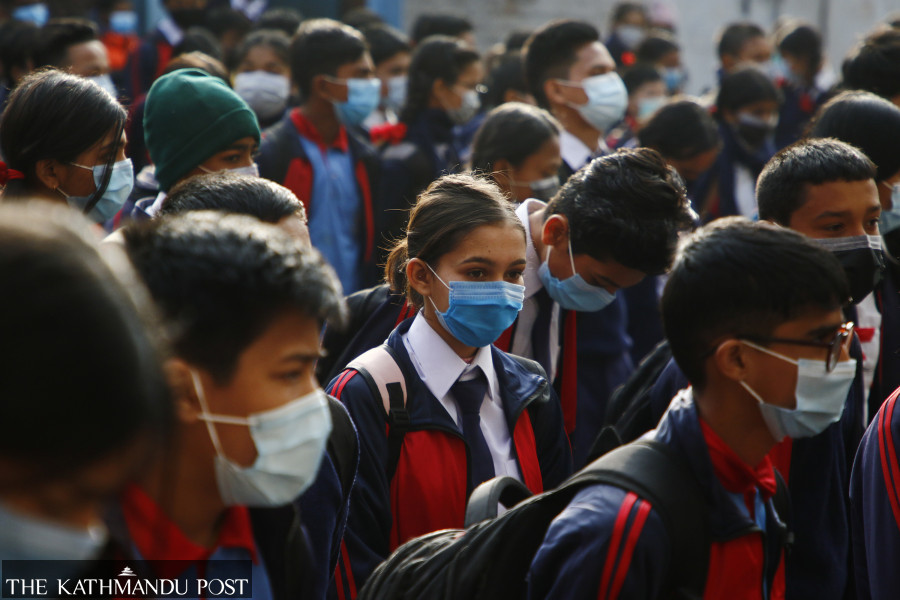Health
Schools could become next epicentre of Covid outbreak, experts warn
Poor monitoring mechanism and lack of seriousness of school administrations to enforce safety measures could invite catastrophe.
Arjun Poudel
Karuna and her brother Aditya, fifth and first grader students at a Kupondole school, have been at home for the last two days after their school was shut when three of the teachers tested positive for Covid-19.
“The children are home because the school decided to close down after three of the teachers caught Covid,” Sobita Ghimire, the mother of two, told the Post.
The school administration has shut the school for four days (until Friday) and a new decision could be taken regarding extension of the closure, according to the teachers.
“All the teachers and staff underwent coronavirus tests today and all results came negative except the three,” Nisha Timalsina, a teacher at the school, told the Post. “As students do not have Covid symptoms, we have not tested them.”
The school administration has asked students to report to school if anyone feels sick or develops Covid-19 like symptoms—fever, sore throat, bady ache, and loss of smell, among others.
This is not an exceptional case. Several schools throughout the country have recorded coronavirus cases after they resumed in-person classes. And what is concerning is neither the school administration, nor the agencies concerned have conducted regular Covid tests of students and teachers.
“Schools could be the next epicentre of the Covid-19 outbreak,” Dr Biraj Karmacharya, an epidemiologist, warned. “Due to poor monitoring and negligence to enforce health measures, the next epicenter of the virus outbreak could be schools and academic institutions.”
Last week, 28 students and teachers at the Tribhuvan Secondary School in Baglung Municipality of Baglung district tested positive for Covid-19. Coronavirus tests were performed on students after a few teachers tested positive.
Bhumeshwar Secondary School in Patan Municipality of Baitadi district has been shut after two students tested positive for the coronavirus.
Despite the risk of an outbreak of the coronavirus, most of the schools and academic institutions have resumed in-person classes after the Dashain holidays.
Health experts say poor monitoring system and apathy of agencies concerned to enforce public health measures could spell another disaster.
“I buy a new mask every day for my son but he always returns home without one,” said Sarala Kattel, a local of Tarakeshwar Municipality-5, Kathmandu. “School does not care whether the students are wearing masks or not.”
Maintaining physical distance at school is not possible, as most of the schools have been running classes in a single shift.
Doctors say neglecting the risks could prove costly.
“Since the beginning, monitoring of the schools has not been done effectively,” Dr Binjawala Shrestha, a public health expert, told the Post. “No one has taken this issue seriously, neither the local and provincial governments nor the central government agencies.”
Officials at the Ministry of Health and Population said that provincial as well as local governments are responsible for monitoring the compliance of the public health measures, as they have permitted the schools to resume in-person classes.
“We have been monitoring schools from time to time,” said Janardan Adhikari, health coordinator of Tarakeshwar Municipality. “We send our employees for monitoring and also advise the school administrations to ensure that public health measures are strictly observed.”
Adhikari conceded that implementation of safety measures–wearing of face masks, maintaining social distance and washing hands–are not being implemented effectively at most schools.
Doctors stress the need for effective monitoring of schools instead of carrying out perfunctory inspection visits.
“Random sampling should be carried out at schools on a regular basis for coronavirus tests, and if anyone is found infected, the school should be shut down,” said Dr Baburam Marasini, former director at the Epidemiology and Disease Control Division. “Schools are one of the many sectors, where huge crowds gather and authorities have turned a blind eye towards the risks.”
Public transportation, public spaces and political gatherings are other sectors, which could turn into superspreading environments, according to health experts.
Although new cases of coronavirus infection have declined of late, people are still getting infected and dying, which means the Delta variant is still circulating in communities.
On Wednesday, 280 people tested positive for Covid—255 in 9,168 polymerase chain reaction tests and 25 in 3,006 antigen tests.
Of the total infected, 134 were from the Kathmandu Valley— 100 in Kathmandu, 31 in Lalitpur and three in Bhaktapur district.
Two coronavirus related deaths were recorded in the last 24 hours.
The number of active cases stands at 6,239 throughout the country.
Nepal so far has received 25,049,840 doses of Covid-19 vaccines—Vero Cell, AstraZeneca, Janssen, Pfizer-BioNTech and Moderna.
As of Wednesday, 8,869,067 people (29.2 percent of the total population) have been fully vaccinated.
Of late, the highly contagious Omicron variant of the coronavirus has been spreading in many countries; two cases have been detected in Nepal too.
The two infected persons, both foreigners, tested negative for the infection on Tuesday after 12 days, according to officials.
Health experts have suggested more precautions to prevent a massive outbreak of the virus, which includes enforcement of safety measures at schools and public places.
“If we continue to allow crowding at schools and public places, we cannot minimise the infection risk,'' said Marasini, the former director at the Epidemiology and Disease Control Division.




 11.84°C Kathmandu
11.84°C Kathmandu















